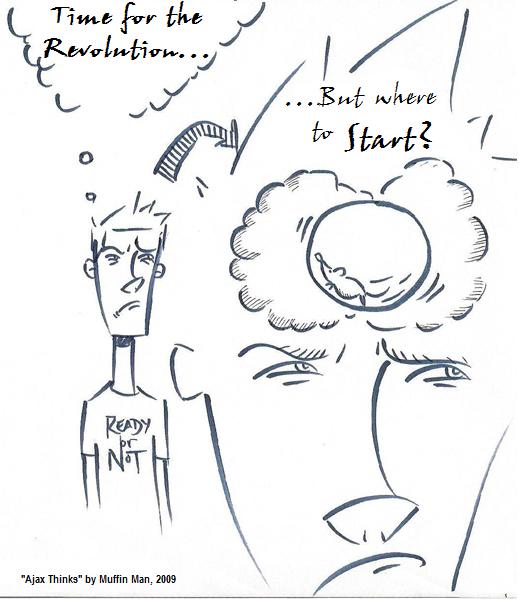I don't think this title makes any sense. I guess you can just eat it then. I'll just give you a general idea, I'd say gist, but I never know how to spell gist. Actually I spelled it gyst and then searched for it and found that that is not at all what I mean. I also searched jist, which is urban slang for just, apparently. Finally I tried gist, which is the main point, and I have subsequently replaced my initial typing of gyst with the intended gist. Feel free to eat that as well, if you would like.
Once in a while people say things that if you give proper attention to you will see that they didn't give proper attention to what they said. I give you that sentence for proof. What? Man, people just don't think before they speak. But that's alright. It gives me something to take out of context, or make overly literal, and then laugh at.
Tonight I heard someone say that someone took a nasty fall. Now, given the context, I know that the fall was nasty, but I wonder, aren't all falls nasty? Can you ever fall and not be injured or embarrassed? Perhaps, it depends on your emotional and physical constitution, but I know I've ever fallen and then remarked on how pleasant it was. Saying it was a nasty fall isn't necessary. I'm not so sure anymore if this is an example of taking something out of context. Let's just say it is and then leave it at that.
This post seems to be falling apart as I type. I had an idea, but now as it fleshes out, maybe it wasn't exactly how I thought it was. Whatever that means. I'll just give you an example of how I think literal scrutiny can alter the message of words. The local news was reporting on a traffic accident. The anchor said "they" (whoever that is) don't think that speed or alcohol were factors in the accident. Okay, I'll allow that they can rule out alcohol so quickly, but really, you don't think speed was a factor? What happens in a traffic accident? Something hits something else. Some form of speed needs to be a factor. If neither of the objects which collide were moving, then they'd never collide. Speed, no matter how slow it can be measured, is a factor whenever two things collide. It is physics, or something.
Speaking of physics. I was splitting wood with some friends a week or so ago and we got a huge, knotted-up log stuck on the wedge. In case you are not familiar with the process of splitting wood with a hydraulic splitter, I recommend watching a documentary about it. This one gnarly log was totally jammed, fused even, onto the wedge. We pushed on it, kicked it and even threw other pieces of wood at it. We put another piece of wood on the slide and tried pushing it into the jammed log in an effort to force it through. No dice. No success either. You see that? I used a phrase that, taken literally, wouldn't have made any sense. Of course there weren't any dice. Maybe this post is going to turn out okay after all.
Back to the stuck piece of wood and physics. I had the brilliant idea that leverage would help put more force on the wood. I grabbed a longer and thinner branch; thinner than what we were splitting, it was probably still 4 inches thick. I used the branch as a ram and slammed it into the stuck piece of wood. One hit knocked it off. Before I had swung it, I told my comrades that physics was the answer. So when my plan was successful I threw down the branch, raised my arms triumphantly and jubilantly shouted "Physics!" I think it was the first, and it may likely be the last, time I have ever jubilantly shouted that word. I remember thinking about working that physics story into a post, but I don't think I ever did. Now that I have, I hope it was worth it. If I already have and you are aware of that, thank you for reading my blog so faithfully. Cheers.
Date Tricks for Guys that Truly Work
5 years ago


No comments:
Post a Comment